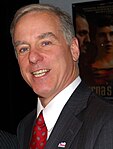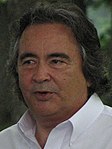The 2000 Vermont gubernatorial election took place on November 7, 2000. Incumbent Democratic governor Howard Dean won re-election. The campaign was dominated by the fallout from the passage of a civil union bill and the subsequent backlash encapsulated by the slogan Take Back Vermont. Ruth Dwyer, the Republican nominee in 1998, ran again in 2000 and was closely tied to the Take Back Vermont movement. Howard Dean, the Democratic governor, favored civil unions and was a primary target of Take Back Vermont.[1]
| |||||||||||||||||||||
| |||||||||||||||||||||
Dean: 30-40% 40-50% 50-60% 60-70% 70-80% 80-90% Dwyer: 30-40% 40-50% 50-60% 60-70% 70-80% | |||||||||||||||||||||
| |||||||||||||||||||||
This is the most recent election in which a governor of Vermont was elected to a fifth term.
Democratic primary
editCandidates
edit- Howard Dean, incumbent governor of Vermont
- Brian Pearl
Results
edit| Party | Candidate | Votes | % | |
|---|---|---|---|---|
| Democratic | Howard Dean (incumbent) | 31,366 | 84.39 | |
| Democratic | Brian Pearl | 4,357 | 11.72 | |
| Democratic | Write-ins | 1,446 | 3.89 | |
| Total votes | 37,169 | 100.00 | ||
Republican primary
editCandidates
edit- Ruth Dwyer, former State Representative and nominee for governor in 1998
- William Meub, attorney
Results
edit| Party | Candidate | Votes | % | |
|---|---|---|---|---|
| Republican | Ruth Dwyer | 46,611 | 57.85 | |
| Republican | William Meub | 33,105 | 41.09 | |
| Republican | Write-ins | 855 | 1.06 | |
| Total votes | 80,571 | 100.00 | ||
General election
editProgressive Anthony Pollina's candidacy nearly succeeded in holding Dean to less than 50 percent, which would have required the Vermont General Assembly to choose a winner.[3] In such races, the joint meeting of the Vermont House and Senate almost always chooses the candidate who received the highest number of votes, but Republicans took control of the Vermont House in 2001, which might have resulted in a contested election.[4]
Debates
edit- Complete video of debate, September 24, 2000
Results
edit| Party | Candidate | Votes | % | ±% | |
|---|---|---|---|---|---|
| Democratic | Howard Dean (incumbent) | 148,059 | 50.45% | −5.22% | |
| Republican | Ruth Dwyer | 111,359 | 37.95% | −3.19% | |
| Progressive | Anthony Pollina | 28,116 | 9.58% | ||
| Independent | Phil Stannard, Sr. | 2,148 | 0.73% | ||
| Grassroots | Joel W. Williams | 1,359 | 0.46% | −1.05% | |
| Independent | Marilyn Verna Christian | 1,054 | 0.36% | ||
| Libertarian | Hardy Macia | 785 | 0.27% | −0.71% | |
| Liberty Union | Richard F. Gottlieb | 337 | 0.11% | −0.42% | |
| Write-in | 256 | 0.09% | |||
| Majority | 36,700 | 12.51% | −2.03% | ||
| Turnout | 293,473 | ||||
| Democratic hold | Swing | ||||
Counties that flipped from Republican to Democratic
edit- Bennington (largest municipality: Bennington)
- Grand Isle (largest municipality: Alburgh)
Counties that flipped from Democratic to Republican
edit- Franklin (largest municipality: St. Albans)
See also
editReferences
edit- ^ Ellen Goodman (November 5, 2000). "'Take Back Vermont,' the signs say, but take it back to what?". The Boston Globe.
- ^ a b "Archived copy" (PDF). Archived from the original (PDF) on December 27, 2010. Retrieved June 3, 2011.
{{cite web}}: CS1 maint: archived copy as title (link) - ^ Power, Marjorie (March 17, 2002). "Commentary: Time has come for IRV reform". Burlington Free Press. Burlington, VT – via FairVote.org.
- ^ Schmaler, Tracy (September 19, 2002). "Lawmakers likely to decide races". Rutland Herald. Rutland, VT.
- ^ "Archived copy" (PDF). Archived from the original (PDF) on July 27, 2011. Retrieved June 3, 2011.
{{cite web}}: CS1 maint: archived copy as title (link)




